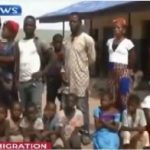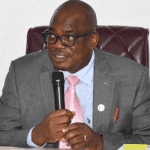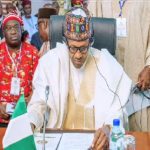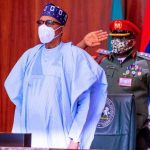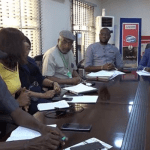The Minister of Humanitarian Affairs, Disaster Management and Social Development, Sadiya Umar Farouq, has reiterated Federal Government commitment to the implementation of the Global Compact on Refugees (GCR), in Nigeria.
The Minister stated this at the opening session of the two-day Nigeria Stakeholders Implementation Meeting on the Global Compact on Refugees, held in Abuja, according to a statement by Rhoda Ishaku Iliya, Deputy Director Information.
She said on 17th December, 2018, the United Nations General Assembly affirmed the Global Compact on Refugees, after two years of extensive consultations led by United Nations High Commissioner for Refugees (UNHCR), with Member States, International organisations, refugees, civil society, the private sector and other relevant experts.
“Nigeria played an active part in the process which was a demonstration of global solidarity and commitment to promote the interest of Persons of Concern, which Nigeria proudly associates with.
“To ensure its effective implementation, the GCR was initiated to enable countries to lay foundations and chart a cause for collective outcomes, the maiden edition of the Forum was held one year after the adoption of the GCR in December, 2019.
“The Nigerian government has been providing support to refugees in Nigeria through the National Commission for Refugees, Migrants and Internally Displaced Persons (NCFRMI). We have over the years increased our assistance and support in response to recent influx of Cameroonian refugees.
“In line with the spirit of the bipartite subproject with UNHCR, we equipped urban refugees in different parts of the country with skills, start-up capital and starter packs to engage in income generating activities that assisted to integrate locally in Nigerian communities.
“We worked with UNHCR and the Nigeria Immigration Service to issue a Convention Travel Document to enable refugees and asylum seekers to exercise the fundamental human rights of movement with all internationally recognised protection and privileges”.
Sadiya Umar Farouq added that the country has consistently remained committed to the implementation of the 1951 United Nations Convention on Refugees and its Protocol, as well as other relevant instruments. “The GCR will only assist us to amplify our efforts and have a gainful traction”, she said.
The Minister assured that the Government of President Buhari through the Ministry of Humanitarian Affairs will continue to strengthen legal, policy and institutional frameworks to ensure full implementation of the GCR, provide all the support for the domestication of the kampala Convention on IDPs and other vulnerable groups in Government social protection programmes that aim to address major underlying causes of displacement.
She urged participants to optimise opportunities for mobilising additional resources and good will that will assist to meet the humanitarian obligation as a country and promote sustainable development.
The Country Representative of the United Nations High Commissioner on Refugees in Nigeria, Mme Chansa Kapaya, in her remarks commended the Federal Government for the exemplary regional leadership to the implementation of the GCR, as well as the Governors of refugee-hosting states for showing tremendous leadership in responding to the refugee crises by ensuring that refugees have access to asylum in Nigeria and access critical life-saving services, including livelihood opportunities where possible.
She said Nigeria’s commitment to the protection of Refugees and asylum –seekers have been renewed on many occasions and Nigeria has demonstrated exemplary reception and support towards forcibly displaced populations as evidenced by the progressive commitments it made at the Global Refugee Forum in 2019 for the implementation of GCR.
She disclosed that Nigeria has committed to the following pledges to include refugees, IDPs and their host communities in government development plans; strengthen national protection capacity; ensure availability and access to durable solutions for refugees and IDPs and continue playing an active role in regional and sub-regional efforts to address the root cause of displacement.
According to her, the primary objective of the stakeholders meeting is to take stock and discuss practical ways to support the government in the implementation of the pledges and objectives of the GCR through a comprehensive Refugee Response Framework Approach in Nigeria.
In their goodwill messages, dignitaries at the event commended the Minister of Humanitarian Affairs, Sadiya Umar Farouq for the good work she is doing in addressing the issues of the most vulnerable persons in Nigeria and pledged their continued support and cooperation in tackling issues of refugees, migrants and internally displaced persons in the country.
The Minister of Humanitarian Affairs, Disaster Management and Social Development, Sadiya Umar Farouq, has reiterated Federal Government commitment to the implementation of the Global Compact on Refugees (GCR), in Nigeria.
The Minister stated this at the opening session of the two-day Nigeria Stakeholders Implementation Meeting on the Global Compact on Refugees, held in Abuja, according to a statement by Rhoda Ishaku Iliya, Deputy Director Information.
She said on 17th December, 2018, the United Nations General Assembly affirmed the Global Compact on Refugees, after two years of extensive consultations led by United Nations High Commissioner for Refugees (UNHCR), with Member States, International organisations, refugees, civil society, the private sector and other relevant experts.
“Nigeria played an active part in the process which was a demonstration of global solidarity and commitment to promote the interest of Persons of Concern, which Nigeria proudly associates with.
“To ensure its effective implementation, the GCR was initiated to enable countries to lay foundations and chart a cause for collective outcomes, the maiden edition of the Forum was held one year after the adoption of the GCR in December, 2019.
“The Nigerian government has been providing support to refugees in Nigeria through the National Commission for Refugees, Migrants and Internally Displaced Persons (NCFRMI). We have over the years increased our assistance and support in response to recent influx of Cameroonian refugees.
“In line with the spirit of the bipartite subproject with UNHCR, we equipped urban refugees in different parts of the country with skills, start-up capital and starter packs to engage in income generating activities that assisted to integrate locally in Nigerian communities.
“We worked with UNHCR and the Nigeria Immigration Service to issue a Convention Travel Document to enable refugees and asylum seekers to exercise the fundamental human rights of movement with all internationally recognised protection and privileges”.
Sadiya Umar Farouq added that the country has consistently remained committed to the implementation of the 1951 United Nations Convention on Refugees and its Protocol, as well as other relevant instruments. “The GCR will only assist us to amplify our efforts and have a gainful traction”, she said.
The Minister assured that the Government of President Buhari through the Ministry of Humanitarian Affairs will continue to strengthen legal, policy and institutional frameworks to ensure full implementation of the GCR, provide all the support for the domestication of the kampala Convention on IDPs and other vulnerable groups in Government social protection programmes that aim to address major underlying causes of displacement.
She urged participants to optimise opportunities for mobilising additional resources and good will that will assist to meet the humanitarian obligation as a country and promote sustainable development.
The Country Representative of the United Nations High Commissioner on Refugees in Nigeria, Mme Chansa Kapaya, in her remarks commended the Federal Government for the exemplary regional leadership to the implementation of the GCR, as well as the Governors of refugee-hosting states for showing tremendous leadership in responding to the refugee crises by ensuring that refugees have access to asylum in Nigeria and access critical life-saving services, including livelihood opportunities where possible.
She said Nigeria’s commitment to the protection of Refugees and asylum –seekers have been renewed on many occasions and Nigeria has demonstrated exemplary reception and support towards forcibly displaced populations as evidenced by the progressive commitments it made at the Global Refugee Forum in 2019 for the implementation of GCR.
She disclosed that Nigeria has committed to the following pledges to include refugees, IDPs and their host communities in government development plans; strengthen national protection capacity; ensure availability and access to durable solutions for refugees and IDPs and continue playing an active role in regional and sub-regional efforts to address the root cause of displacement.
According to her, the primary objective of the stakeholders meeting is to take stock and discuss practical ways to support the government in the implementation of the pledges and objectives of the GCR through a comprehensive Refugee Response Framework Approach in Nigeria.
In their goodwill messages, dignitaries at the event commended the Minister of Humanitarian Affairs, Sadiya Umar Farouq for the good work she is doing in addressing the issues of the most vulnerable persons in Nigeria and pledged their continued support and cooperation in tackling issues of refugees, migrants and internally displaced persons in the country.
The Minister of Humanitarian Affairs, Disaster Management and Social Development, Sadiya Umar Farouq, has reiterated Federal Government commitment to the implementation of the Global Compact on Refugees (GCR), in Nigeria.
The Minister stated this at the opening session of the two-day Nigeria Stakeholders Implementation Meeting on the Global Compact on Refugees, held in Abuja, according to a statement by Rhoda Ishaku Iliya, Deputy Director Information.
She said on 17th December, 2018, the United Nations General Assembly affirmed the Global Compact on Refugees, after two years of extensive consultations led by United Nations High Commissioner for Refugees (UNHCR), with Member States, International organisations, refugees, civil society, the private sector and other relevant experts.
“Nigeria played an active part in the process which was a demonstration of global solidarity and commitment to promote the interest of Persons of Concern, which Nigeria proudly associates with.
“To ensure its effective implementation, the GCR was initiated to enable countries to lay foundations and chart a cause for collective outcomes, the maiden edition of the Forum was held one year after the adoption of the GCR in December, 2019.
“The Nigerian government has been providing support to refugees in Nigeria through the National Commission for Refugees, Migrants and Internally Displaced Persons (NCFRMI). We have over the years increased our assistance and support in response to recent influx of Cameroonian refugees.
“In line with the spirit of the bipartite subproject with UNHCR, we equipped urban refugees in different parts of the country with skills, start-up capital and starter packs to engage in income generating activities that assisted to integrate locally in Nigerian communities.
“We worked with UNHCR and the Nigeria Immigration Service to issue a Convention Travel Document to enable refugees and asylum seekers to exercise the fundamental human rights of movement with all internationally recognised protection and privileges”.
Sadiya Umar Farouq added that the country has consistently remained committed to the implementation of the 1951 United Nations Convention on Refugees and its Protocol, as well as other relevant instruments. “The GCR will only assist us to amplify our efforts and have a gainful traction”, she said.
The Minister assured that the Government of President Buhari through the Ministry of Humanitarian Affairs will continue to strengthen legal, policy and institutional frameworks to ensure full implementation of the GCR, provide all the support for the domestication of the kampala Convention on IDPs and other vulnerable groups in Government social protection programmes that aim to address major underlying causes of displacement.
She urged participants to optimise opportunities for mobilising additional resources and good will that will assist to meet the humanitarian obligation as a country and promote sustainable development.
The Country Representative of the United Nations High Commissioner on Refugees in Nigeria, Mme Chansa Kapaya, in her remarks commended the Federal Government for the exemplary regional leadership to the implementation of the GCR, as well as the Governors of refugee-hosting states for showing tremendous leadership in responding to the refugee crises by ensuring that refugees have access to asylum in Nigeria and access critical life-saving services, including livelihood opportunities where possible.
She said Nigeria’s commitment to the protection of Refugees and asylum –seekers have been renewed on many occasions and Nigeria has demonstrated exemplary reception and support towards forcibly displaced populations as evidenced by the progressive commitments it made at the Global Refugee Forum in 2019 for the implementation of GCR.
She disclosed that Nigeria has committed to the following pledges to include refugees, IDPs and their host communities in government development plans; strengthen national protection capacity; ensure availability and access to durable solutions for refugees and IDPs and continue playing an active role in regional and sub-regional efforts to address the root cause of displacement.
According to her, the primary objective of the stakeholders meeting is to take stock and discuss practical ways to support the government in the implementation of the pledges and objectives of the GCR through a comprehensive Refugee Response Framework Approach in Nigeria.
In their goodwill messages, dignitaries at the event commended the Minister of Humanitarian Affairs, Sadiya Umar Farouq for the good work she is doing in addressing the issues of the most vulnerable persons in Nigeria and pledged their continued support and cooperation in tackling issues of refugees, migrants and internally displaced persons in the country.
The Minister of Humanitarian Affairs, Disaster Management and Social Development, Sadiya Umar Farouq, has reiterated Federal Government commitment to the implementation of the Global Compact on Refugees (GCR), in Nigeria.
The Minister stated this at the opening session of the two-day Nigeria Stakeholders Implementation Meeting on the Global Compact on Refugees, held in Abuja, according to a statement by Rhoda Ishaku Iliya, Deputy Director Information.
She said on 17th December, 2018, the United Nations General Assembly affirmed the Global Compact on Refugees, after two years of extensive consultations led by United Nations High Commissioner for Refugees (UNHCR), with Member States, International organisations, refugees, civil society, the private sector and other relevant experts.
“Nigeria played an active part in the process which was a demonstration of global solidarity and commitment to promote the interest of Persons of Concern, which Nigeria proudly associates with.
“To ensure its effective implementation, the GCR was initiated to enable countries to lay foundations and chart a cause for collective outcomes, the maiden edition of the Forum was held one year after the adoption of the GCR in December, 2019.
“The Nigerian government has been providing support to refugees in Nigeria through the National Commission for Refugees, Migrants and Internally Displaced Persons (NCFRMI). We have over the years increased our assistance and support in response to recent influx of Cameroonian refugees.
“In line with the spirit of the bipartite subproject with UNHCR, we equipped urban refugees in different parts of the country with skills, start-up capital and starter packs to engage in income generating activities that assisted to integrate locally in Nigerian communities.
“We worked with UNHCR and the Nigeria Immigration Service to issue a Convention Travel Document to enable refugees and asylum seekers to exercise the fundamental human rights of movement with all internationally recognised protection and privileges”.
Sadiya Umar Farouq added that the country has consistently remained committed to the implementation of the 1951 United Nations Convention on Refugees and its Protocol, as well as other relevant instruments. “The GCR will only assist us to amplify our efforts and have a gainful traction”, she said.
The Minister assured that the Government of President Buhari through the Ministry of Humanitarian Affairs will continue to strengthen legal, policy and institutional frameworks to ensure full implementation of the GCR, provide all the support for the domestication of the kampala Convention on IDPs and other vulnerable groups in Government social protection programmes that aim to address major underlying causes of displacement.
She urged participants to optimise opportunities for mobilising additional resources and good will that will assist to meet the humanitarian obligation as a country and promote sustainable development.
The Country Representative of the United Nations High Commissioner on Refugees in Nigeria, Mme Chansa Kapaya, in her remarks commended the Federal Government for the exemplary regional leadership to the implementation of the GCR, as well as the Governors of refugee-hosting states for showing tremendous leadership in responding to the refugee crises by ensuring that refugees have access to asylum in Nigeria and access critical life-saving services, including livelihood opportunities where possible.
She said Nigeria’s commitment to the protection of Refugees and asylum –seekers have been renewed on many occasions and Nigeria has demonstrated exemplary reception and support towards forcibly displaced populations as evidenced by the progressive commitments it made at the Global Refugee Forum in 2019 for the implementation of GCR.
She disclosed that Nigeria has committed to the following pledges to include refugees, IDPs and their host communities in government development plans; strengthen national protection capacity; ensure availability and access to durable solutions for refugees and IDPs and continue playing an active role in regional and sub-regional efforts to address the root cause of displacement.
According to her, the primary objective of the stakeholders meeting is to take stock and discuss practical ways to support the government in the implementation of the pledges and objectives of the GCR through a comprehensive Refugee Response Framework Approach in Nigeria.
In their goodwill messages, dignitaries at the event commended the Minister of Humanitarian Affairs, Sadiya Umar Farouq for the good work she is doing in addressing the issues of the most vulnerable persons in Nigeria and pledged their continued support and cooperation in tackling issues of refugees, migrants and internally displaced persons in the country.
The Minister of Humanitarian Affairs, Disaster Management and Social Development, Sadiya Umar Farouq, has reiterated Federal Government commitment to the implementation of the Global Compact on Refugees (GCR), in Nigeria.
The Minister stated this at the opening session of the two-day Nigeria Stakeholders Implementation Meeting on the Global Compact on Refugees, held in Abuja, according to a statement by Rhoda Ishaku Iliya, Deputy Director Information.
She said on 17th December, 2018, the United Nations General Assembly affirmed the Global Compact on Refugees, after two years of extensive consultations led by United Nations High Commissioner for Refugees (UNHCR), with Member States, International organisations, refugees, civil society, the private sector and other relevant experts.
“Nigeria played an active part in the process which was a demonstration of global solidarity and commitment to promote the interest of Persons of Concern, which Nigeria proudly associates with.
“To ensure its effective implementation, the GCR was initiated to enable countries to lay foundations and chart a cause for collective outcomes, the maiden edition of the Forum was held one year after the adoption of the GCR in December, 2019.
“The Nigerian government has been providing support to refugees in Nigeria through the National Commission for Refugees, Migrants and Internally Displaced Persons (NCFRMI). We have over the years increased our assistance and support in response to recent influx of Cameroonian refugees.
“In line with the spirit of the bipartite subproject with UNHCR, we equipped urban refugees in different parts of the country with skills, start-up capital and starter packs to engage in income generating activities that assisted to integrate locally in Nigerian communities.
“We worked with UNHCR and the Nigeria Immigration Service to issue a Convention Travel Document to enable refugees and asylum seekers to exercise the fundamental human rights of movement with all internationally recognised protection and privileges”.
Sadiya Umar Farouq added that the country has consistently remained committed to the implementation of the 1951 United Nations Convention on Refugees and its Protocol, as well as other relevant instruments. “The GCR will only assist us to amplify our efforts and have a gainful traction”, she said.
The Minister assured that the Government of President Buhari through the Ministry of Humanitarian Affairs will continue to strengthen legal, policy and institutional frameworks to ensure full implementation of the GCR, provide all the support for the domestication of the kampala Convention on IDPs and other vulnerable groups in Government social protection programmes that aim to address major underlying causes of displacement.
She urged participants to optimise opportunities for mobilising additional resources and good will that will assist to meet the humanitarian obligation as a country and promote sustainable development.
The Country Representative of the United Nations High Commissioner on Refugees in Nigeria, Mme Chansa Kapaya, in her remarks commended the Federal Government for the exemplary regional leadership to the implementation of the GCR, as well as the Governors of refugee-hosting states for showing tremendous leadership in responding to the refugee crises by ensuring that refugees have access to asylum in Nigeria and access critical life-saving services, including livelihood opportunities where possible.
She said Nigeria’s commitment to the protection of Refugees and asylum –seekers have been renewed on many occasions and Nigeria has demonstrated exemplary reception and support towards forcibly displaced populations as evidenced by the progressive commitments it made at the Global Refugee Forum in 2019 for the implementation of GCR.
She disclosed that Nigeria has committed to the following pledges to include refugees, IDPs and their host communities in government development plans; strengthen national protection capacity; ensure availability and access to durable solutions for refugees and IDPs and continue playing an active role in regional and sub-regional efforts to address the root cause of displacement.
According to her, the primary objective of the stakeholders meeting is to take stock and discuss practical ways to support the government in the implementation of the pledges and objectives of the GCR through a comprehensive Refugee Response Framework Approach in Nigeria.
In their goodwill messages, dignitaries at the event commended the Minister of Humanitarian Affairs, Sadiya Umar Farouq for the good work she is doing in addressing the issues of the most vulnerable persons in Nigeria and pledged their continued support and cooperation in tackling issues of refugees, migrants and internally displaced persons in the country.
The Minister of Humanitarian Affairs, Disaster Management and Social Development, Sadiya Umar Farouq, has reiterated Federal Government commitment to the implementation of the Global Compact on Refugees (GCR), in Nigeria.
The Minister stated this at the opening session of the two-day Nigeria Stakeholders Implementation Meeting on the Global Compact on Refugees, held in Abuja, according to a statement by Rhoda Ishaku Iliya, Deputy Director Information.
She said on 17th December, 2018, the United Nations General Assembly affirmed the Global Compact on Refugees, after two years of extensive consultations led by United Nations High Commissioner for Refugees (UNHCR), with Member States, International organisations, refugees, civil society, the private sector and other relevant experts.
“Nigeria played an active part in the process which was a demonstration of global solidarity and commitment to promote the interest of Persons of Concern, which Nigeria proudly associates with.
“To ensure its effective implementation, the GCR was initiated to enable countries to lay foundations and chart a cause for collective outcomes, the maiden edition of the Forum was held one year after the adoption of the GCR in December, 2019.
“The Nigerian government has been providing support to refugees in Nigeria through the National Commission for Refugees, Migrants and Internally Displaced Persons (NCFRMI). We have over the years increased our assistance and support in response to recent influx of Cameroonian refugees.
“In line with the spirit of the bipartite subproject with UNHCR, we equipped urban refugees in different parts of the country with skills, start-up capital and starter packs to engage in income generating activities that assisted to integrate locally in Nigerian communities.
“We worked with UNHCR and the Nigeria Immigration Service to issue a Convention Travel Document to enable refugees and asylum seekers to exercise the fundamental human rights of movement with all internationally recognised protection and privileges”.
Sadiya Umar Farouq added that the country has consistently remained committed to the implementation of the 1951 United Nations Convention on Refugees and its Protocol, as well as other relevant instruments. “The GCR will only assist us to amplify our efforts and have a gainful traction”, she said.
The Minister assured that the Government of President Buhari through the Ministry of Humanitarian Affairs will continue to strengthen legal, policy and institutional frameworks to ensure full implementation of the GCR, provide all the support for the domestication of the kampala Convention on IDPs and other vulnerable groups in Government social protection programmes that aim to address major underlying causes of displacement.
She urged participants to optimise opportunities for mobilising additional resources and good will that will assist to meet the humanitarian obligation as a country and promote sustainable development.
The Country Representative of the United Nations High Commissioner on Refugees in Nigeria, Mme Chansa Kapaya, in her remarks commended the Federal Government for the exemplary regional leadership to the implementation of the GCR, as well as the Governors of refugee-hosting states for showing tremendous leadership in responding to the refugee crises by ensuring that refugees have access to asylum in Nigeria and access critical life-saving services, including livelihood opportunities where possible.
She said Nigeria’s commitment to the protection of Refugees and asylum –seekers have been renewed on many occasions and Nigeria has demonstrated exemplary reception and support towards forcibly displaced populations as evidenced by the progressive commitments it made at the Global Refugee Forum in 2019 for the implementation of GCR.
She disclosed that Nigeria has committed to the following pledges to include refugees, IDPs and their host communities in government development plans; strengthen national protection capacity; ensure availability and access to durable solutions for refugees and IDPs and continue playing an active role in regional and sub-regional efforts to address the root cause of displacement.
According to her, the primary objective of the stakeholders meeting is to take stock and discuss practical ways to support the government in the implementation of the pledges and objectives of the GCR through a comprehensive Refugee Response Framework Approach in Nigeria.
In their goodwill messages, dignitaries at the event commended the Minister of Humanitarian Affairs, Sadiya Umar Farouq for the good work she is doing in addressing the issues of the most vulnerable persons in Nigeria and pledged their continued support and cooperation in tackling issues of refugees, migrants and internally displaced persons in the country.
The Minister of Humanitarian Affairs, Disaster Management and Social Development, Sadiya Umar Farouq, has reiterated Federal Government commitment to the implementation of the Global Compact on Refugees (GCR), in Nigeria.
The Minister stated this at the opening session of the two-day Nigeria Stakeholders Implementation Meeting on the Global Compact on Refugees, held in Abuja, according to a statement by Rhoda Ishaku Iliya, Deputy Director Information.
She said on 17th December, 2018, the United Nations General Assembly affirmed the Global Compact on Refugees, after two years of extensive consultations led by United Nations High Commissioner for Refugees (UNHCR), with Member States, International organisations, refugees, civil society, the private sector and other relevant experts.
“Nigeria played an active part in the process which was a demonstration of global solidarity and commitment to promote the interest of Persons of Concern, which Nigeria proudly associates with.
“To ensure its effective implementation, the GCR was initiated to enable countries to lay foundations and chart a cause for collective outcomes, the maiden edition of the Forum was held one year after the adoption of the GCR in December, 2019.
“The Nigerian government has been providing support to refugees in Nigeria through the National Commission for Refugees, Migrants and Internally Displaced Persons (NCFRMI). We have over the years increased our assistance and support in response to recent influx of Cameroonian refugees.
“In line with the spirit of the bipartite subproject with UNHCR, we equipped urban refugees in different parts of the country with skills, start-up capital and starter packs to engage in income generating activities that assisted to integrate locally in Nigerian communities.
“We worked with UNHCR and the Nigeria Immigration Service to issue a Convention Travel Document to enable refugees and asylum seekers to exercise the fundamental human rights of movement with all internationally recognised protection and privileges”.
Sadiya Umar Farouq added that the country has consistently remained committed to the implementation of the 1951 United Nations Convention on Refugees and its Protocol, as well as other relevant instruments. “The GCR will only assist us to amplify our efforts and have a gainful traction”, she said.
The Minister assured that the Government of President Buhari through the Ministry of Humanitarian Affairs will continue to strengthen legal, policy and institutional frameworks to ensure full implementation of the GCR, provide all the support for the domestication of the kampala Convention on IDPs and other vulnerable groups in Government social protection programmes that aim to address major underlying causes of displacement.
She urged participants to optimise opportunities for mobilising additional resources and good will that will assist to meet the humanitarian obligation as a country and promote sustainable development.
The Country Representative of the United Nations High Commissioner on Refugees in Nigeria, Mme Chansa Kapaya, in her remarks commended the Federal Government for the exemplary regional leadership to the implementation of the GCR, as well as the Governors of refugee-hosting states for showing tremendous leadership in responding to the refugee crises by ensuring that refugees have access to asylum in Nigeria and access critical life-saving services, including livelihood opportunities where possible.
She said Nigeria’s commitment to the protection of Refugees and asylum –seekers have been renewed on many occasions and Nigeria has demonstrated exemplary reception and support towards forcibly displaced populations as evidenced by the progressive commitments it made at the Global Refugee Forum in 2019 for the implementation of GCR.
She disclosed that Nigeria has committed to the following pledges to include refugees, IDPs and their host communities in government development plans; strengthen national protection capacity; ensure availability and access to durable solutions for refugees and IDPs and continue playing an active role in regional and sub-regional efforts to address the root cause of displacement.
According to her, the primary objective of the stakeholders meeting is to take stock and discuss practical ways to support the government in the implementation of the pledges and objectives of the GCR through a comprehensive Refugee Response Framework Approach in Nigeria.
In their goodwill messages, dignitaries at the event commended the Minister of Humanitarian Affairs, Sadiya Umar Farouq for the good work she is doing in addressing the issues of the most vulnerable persons in Nigeria and pledged their continued support and cooperation in tackling issues of refugees, migrants and internally displaced persons in the country.
The Minister of Humanitarian Affairs, Disaster Management and Social Development, Sadiya Umar Farouq, has reiterated Federal Government commitment to the implementation of the Global Compact on Refugees (GCR), in Nigeria.
The Minister stated this at the opening session of the two-day Nigeria Stakeholders Implementation Meeting on the Global Compact on Refugees, held in Abuja, according to a statement by Rhoda Ishaku Iliya, Deputy Director Information.
She said on 17th December, 2018, the United Nations General Assembly affirmed the Global Compact on Refugees, after two years of extensive consultations led by United Nations High Commissioner for Refugees (UNHCR), with Member States, International organisations, refugees, civil society, the private sector and other relevant experts.
“Nigeria played an active part in the process which was a demonstration of global solidarity and commitment to promote the interest of Persons of Concern, which Nigeria proudly associates with.
“To ensure its effective implementation, the GCR was initiated to enable countries to lay foundations and chart a cause for collective outcomes, the maiden edition of the Forum was held one year after the adoption of the GCR in December, 2019.
“The Nigerian government has been providing support to refugees in Nigeria through the National Commission for Refugees, Migrants and Internally Displaced Persons (NCFRMI). We have over the years increased our assistance and support in response to recent influx of Cameroonian refugees.
“In line with the spirit of the bipartite subproject with UNHCR, we equipped urban refugees in different parts of the country with skills, start-up capital and starter packs to engage in income generating activities that assisted to integrate locally in Nigerian communities.
“We worked with UNHCR and the Nigeria Immigration Service to issue a Convention Travel Document to enable refugees and asylum seekers to exercise the fundamental human rights of movement with all internationally recognised protection and privileges”.
Sadiya Umar Farouq added that the country has consistently remained committed to the implementation of the 1951 United Nations Convention on Refugees and its Protocol, as well as other relevant instruments. “The GCR will only assist us to amplify our efforts and have a gainful traction”, she said.
The Minister assured that the Government of President Buhari through the Ministry of Humanitarian Affairs will continue to strengthen legal, policy and institutional frameworks to ensure full implementation of the GCR, provide all the support for the domestication of the kampala Convention on IDPs and other vulnerable groups in Government social protection programmes that aim to address major underlying causes of displacement.
She urged participants to optimise opportunities for mobilising additional resources and good will that will assist to meet the humanitarian obligation as a country and promote sustainable development.
The Country Representative of the United Nations High Commissioner on Refugees in Nigeria, Mme Chansa Kapaya, in her remarks commended the Federal Government for the exemplary regional leadership to the implementation of the GCR, as well as the Governors of refugee-hosting states for showing tremendous leadership in responding to the refugee crises by ensuring that refugees have access to asylum in Nigeria and access critical life-saving services, including livelihood opportunities where possible.
She said Nigeria’s commitment to the protection of Refugees and asylum –seekers have been renewed on many occasions and Nigeria has demonstrated exemplary reception and support towards forcibly displaced populations as evidenced by the progressive commitments it made at the Global Refugee Forum in 2019 for the implementation of GCR.
She disclosed that Nigeria has committed to the following pledges to include refugees, IDPs and their host communities in government development plans; strengthen national protection capacity; ensure availability and access to durable solutions for refugees and IDPs and continue playing an active role in regional and sub-regional efforts to address the root cause of displacement.
According to her, the primary objective of the stakeholders meeting is to take stock and discuss practical ways to support the government in the implementation of the pledges and objectives of the GCR through a comprehensive Refugee Response Framework Approach in Nigeria.
In their goodwill messages, dignitaries at the event commended the Minister of Humanitarian Affairs, Sadiya Umar Farouq for the good work she is doing in addressing the issues of the most vulnerable persons in Nigeria and pledged their continued support and cooperation in tackling issues of refugees, migrants and internally displaced persons in the country.



